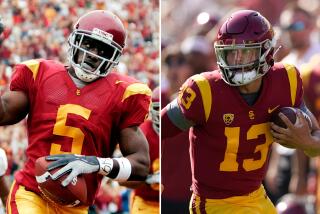Faulk Is Talk of the Hometown : Football: His old neighborhood is waiting for the Heisman Trophy results to be announced.
- Share via
NEW ORLEANS — In the dingy halls, the crowded classrooms and the musty locker room at Carver High School, the talk has been about one thing this week--Marshall Faulk, the former student who has made headlines and might make history.
“It’s a super-big deal around here,” said Richard Johnson, a senior receiver who played football with Faulk before the Heisman Trophy candidate went to San Diego State. “The whole school will be lined up in front of their television sets praying for Marshall.”
Faulk, the SDSU sophomore who led the nation in rushing for the second straight year, but missed 2 1/2 games, could become the first sophomore ever to win the Heisman. The trophy is being awarded today.
On Thursday, Faulk was named to the 1992 All-American team for the second time. He is the second major-college player to gain more than 3,000 yards in his first two seasons. Herschel Walker also did it.
At Carver, one of New Orleans’ poorest public schools, pride was once a scarce commodity. That’s changing some these days thanks mainly to the school’s superstar.
“We’ve been ashamed back here for so long people didn’t know there was another way to be,” Coach Wayne Reese said. “Since the Marshall era, that’s changed. Now our kids have their heads up and a way out.”
The school, surrounded by a high fence topped with barbed wire, sits in a pocket of crumbling housing project apartments, dilapidated houses and warehouses. Trash has piled up against the fence and is scattered along the streets.
The average income of Carver families is $7,000 a year, Reese said. Every student at the school qualifies for the free lunch program, and test fees for the ACT and SAT tests are waived.
In the six years since he became the Carver coach, Reese has helped get Faulk and his other players part-time jobs so they would have money for food. He’s taken them into his home, and he has urged his seniors to attend college.
“I tell my kids athletics and academics are all they have,” Reese said. “They better treat them like golden spoons.”
In Faulk they have a special role model, Reese said.
“He comes back here and it’s like a holiday for everyone,” Reese said. “He comes back and lifts weights with the team, jogs with them, talks to them. They see how hard work paid off for him.”
For kids who see crime, violence and drug deals almost daily, having someone like Faulk makes a difference.
Carver had no junior varsity program and only 40 players on the varsity when Reese took over. This year there were 75 varsity players and his three seniors all are academically eligible and being heavily recruited, Reese said.
“Football means a world of difference to these kids,” Reese said. “We have some kids on our junior varsity that I know would be in jail if they weren’t on the team. We lose a whole lot of kids to crime.”
College can mean a new life for Carver students, Reese said.
“When these kids get to college and have three meals a day for a change, a bed to sleep in instead of someone’s couch or floor, no one shooting at them, they really blossom,” he said.
Reese would like to have been in New York when the Heisman was awarded, but his junior varsity plays in a state championship game Saturday morning in the Louisiana Superdome and he didn’t feel he could miss it.
“I think (Faulk) should win it. I think he’s not just the best football player, he’s the best athlete. People don’t even know yet how good he is. He’s still developing,” Reese said. “If he doesn’t, it’ll probably hurt us a lot more than him. They only time I saw him show emotion was in the state all-star game. He wanted to play running back and show people what he could do and they made him play defensive back instead. He cried, but he played it.”
More to Read
Go beyond the scoreboard
Get the latest on L.A.'s teams in the daily Sports Report newsletter.
You may occasionally receive promotional content from the Los Angeles Times.










